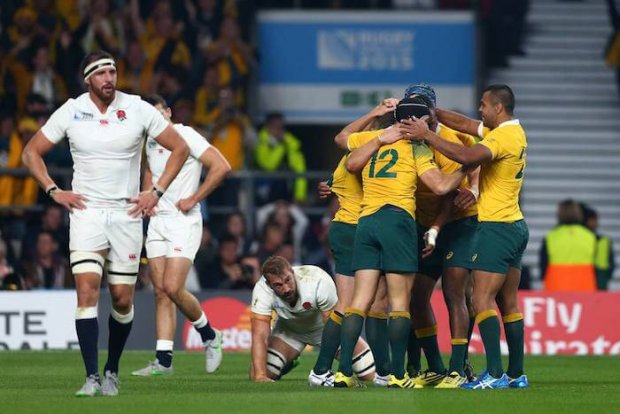Australia’s performance aside, one of the heavyweights of the game bowed out of the World Cup this weekend, and at home to boot. Selections mattered. So too did coaching. But these need to be seen through the broader optic of identity and mentality: how the English rugby establishment understood what the team would try to do on the field and why.
Traditionally, the English game has been little more than ten man rugby: forward dominance and field position. As the game has gone professional, however, English rugby has broadened both in style and personnel.
As to the former, the English premiership has created a sophisticated, competitive atmosphere for market-oriented rugby. True, not every clash is appealing to the eye. But the combination of fervid local support pumping in money and a season running into late spring has slowly pushed teams to embrace more expansive styles.
As to the latter, English rugby is somewhat socio-economically broader than in the past. Nine of its squad this year attended state schools, cracking – somewhat – the dominance of private school, old boys club mentalities. With this influx has come new talent, ideas, and culture.
The problem for England is that the very mentality of the English game is in transition. Do they go with the more attacking style epitomised by George Ford, Jonathan Joseph, and Anthony Watson, or the more stodgy and direct, characterised by guys like Brad Barritt and Owen Farrell?
In a nice little microcosm of this fundamental dilemma, England didn’t even know which approach to take within the one tournament. Having heavily invested in Farrell since 2012, and then made a change in direction towards Ford in November 2014, the coaches once again went back to the more conservative option for the Wales and Australia matches. The rest is history. In search of balance, they instead had backlines that contained elements working in fundamentally different patterns. Having one big Clydesdale and one race-fit mare leading the chariot isn’t going to produce balance as much as it will dysfunction.
The next national coach will need to delineate where English rugby is going and how its teams will play – from the top right down to the clubs. They need a strategist, a philosopher, as much as a tactician.
Moreover, this needs to be a search that goes far beyond back-line play. It is true that including players like Luther Burrell, Elliot Daly, and Henry Slade may well have added a lot more dynamism to England’s backs. But you can’t spread the ball if your pack isn’t going to be able to get there. The development – not just selection – of forwards based solely on set piece and tight-loose ability needs to stop.
Australia’s backrow stocks on Saturday consisted of Michael Hooper, David Pocock, and Scott Fardy, with the mobile and versatile Ben McCalman on the bench. England’s was Chris Robshaw, Tom Wood, Ben Morgan, and 37 year old (that’s not a typo) Nick Easter. Every single one of the Australian backrowers is fitter, more mobile, and better in the loose than each one of their English counterparts.
It’s not just a backrow issue either. The tight five, particularly without Courtney Lawes, looked far too one-dimensional. As Sekope Kepu’s wondrous flick showed up, the English front row simply don’t have anything approaching that type of skill in attack. Surely, if we imagine where the game is going over the next four years, the requirement that all fifteen players be able to contribute with ball in hand is more or less inevitable, which means shifting the pill and understanding space, not just carting it up. The All Blacks have shown this all too clearly.
Of course, it isn’t all doom and gloom for the English. The acknowledgement by the clubs that the national team remains the pinnacle of English rugby (in stark contrast to the corrosive attitude of the French clubs) is a great strength (though with recent salary cap arguments, this could change). Moreover, as a national set-up, England has more players and more money than anyone else.
If they can find a coach with the guts to transcend the ways of the past, the skills to make it work, and – perhaps most importantly – the credibility within English rugby to bring doubters along through the tough times, the resources will be there.


